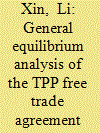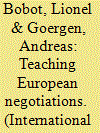| Srl | Item |
| 1 |
ID:
130916


|
|
|
|
|
| Publication |
2014.
|
| Summary/Abstract |
The approaching tenth year of the Doha Round with no achievements to celebrate indicates a failure of the World Trade Organization. Formal negotiations of the Round expired in 2005 without reaching a consensus, and informal negotiations were stalled in 2008. Thus, the Trans-Pacific Partnership (TPP), a recent initiative to deepen trade relations among countries bordering the Pacific, was greeted with applause and relief as a step in the right direction. This article discusses the region-wide Free Trade Agreement series of linked agreements that cover various members and issues. The recursive dynamic computable general equilibrium (CGE) model simulates two scenarios against the baseline, namely, a TPP agreement with China and without China. The preliminary results show that the TPP agreement without China cannot change the significant roles of markets and geography as the principal factors behind the economic integration of Southeast Asia with China. Trade and investment agreements facilitate market forces, they do not oppose them. The integration of the Asia-Pacific countries may benefit the US and other key economies.
|
|
|
|
|
|
|
|
|
|
|
|
|
|
|
|
| 2 |
ID:
098448


|
|
|
|
|
| Publication |
2010.
|
| Summary/Abstract |
The European Union is probably the most complex political and institutional decision-making structure known to humankind. Nowadays, scholars increasingly agree that no single theory can explain all the mechanisms at work in the system of EU governance and decision-making at all levels in any satisfactory way. Even for trained experts and specialists, the complexity of the EU machinery is extremely difficult to grasp. The extensive academic debate in this area is an indicator for both the sophistication of the scholarly discussion and the uncertainty of those who are trying to understand and explain the European integration project. For students who are just learning about the field, trying to untangle that complexity is even more challenging. The difficult task for teachers and instructors is finding ways to introduce students to the institutional framework and the related legislative processes of EU decision-making, and thereby help to facilitate their understanding of the nature of the Union. The purpose of this study is to suggest an alternative teaching method. The simulation "EU Chocolate Directive," can provide participants with the tools necessary to negotiate more effectively at the EU level.
|
|
|
|
|
|
|
|
|
|
|
|
|
|
|
|